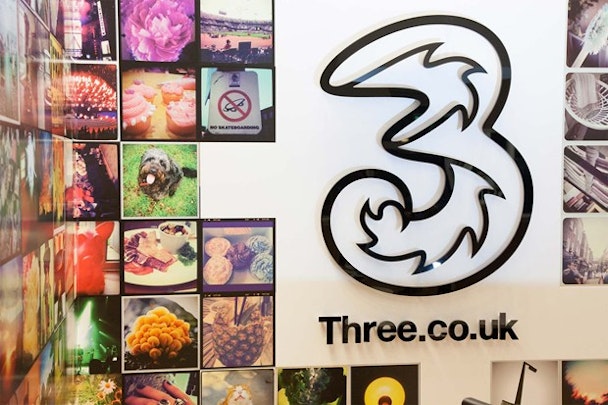Three spins ad blocking deal as 'customer friendly service'
Three to use ad blocking to ruffle the ad industry to run sharper targeted ads

Three asserts it’s too early to say how its move to block mobile ads across the network will translate into revenue but plans to use it as a way to nudge the ad industry into producing more relevant ads, writes Seb Joseph and Ronan Shields.
“This isn’t about ad blocking per se,” explained the network’s chief marketing officer Tom Malleschitz of his brand’s decision to partner with Shine and clamp down on mobile ads. Instead, he said the union is the precursor to Three using the prospect of “relevant”, “targeted” ads as a way to recruit more customers when it eventually launches later this year. At a time when more people know how much intrusive mobile ads eat into their data allowances, a network positioned as the antithesis of this could tempt many to make the switch.
Speaking with The Drum, Malleschitz said: “One of these advantages is that you’re basically blocking ads across different applications from browsers to apps to encrypted HTTP streams to non-encrypted ones. You become independent of operating systems and the way users use their phone.”
It’s a move indicative of telcos increasingly realising that there’s a slice of the mobile advertising pie to be had. This has been on the agenda for some time, indicated by O2, EE and Vodafone’s earlier decision to join together and form Weve, as well as the lukewarm results of the O2 merger last May.
However, a lack of the right technology to harness and apply the data has held them back. After testing different ad blockers out for over a year, Three believes it’s found the right partner in Shine to create a new revenue stream from the practice.
And while Malleschitz said no plans to do that end have been firmed up, he did say he wants to “cooperate with the ad networks” like Google and Facebook to “improve the ad quality” via an opt-in service.
The marketer said the “next step” is working with the ad industry to realise Three’s ambition to “create a product for our customers” which adhere to three principles: no customers should pay data charges to receive ads; ads shouldn’t co-opt peoples’ data without their consent or knowledge; and that ads should be targeted to the individual.
“We need to improve the ad quality [across the network],” said Malleschitz. “The whole telecoms industry needs to change otherwise the whole model won’t survive.”
“We have the instruments now in our network and we want to create something which is relevant because as a marketer I want people to be inspired and see my product but I can only do that if I’m relevant and not annoying you with my purple Jackson puppet for example,” he added.
Such a move raises questions over whether Three would split revenue from the deal with the likes of Google and Facebook, though Malleschitz again said it was too early to discuss any potential outcomes. However, media experts are in no doubt that Three is making a major move for mobile advertising revenue by attempting to pressure the ad industry into sharing the spoils from smaller screens
“Companies like Verizon started fixing this last year with its purchase of AOL,” said Shenda Loughnane, global strategy director at iProspect.
“Of course, it remains to be seen if there will be some kind of revenue share deal following the Three/Shine partnership, but the move is a clear statement of intent that Three sees mobile advertising as a serious revenue stream. As to whether the official reasoning of giving control to customers holds any real weight – it will certainly be a popular move and has served Apple well, but I’d guess that it’s more than likely a welcome side-effect of a savvy business move.”
The network-based ad blocker will reportedly block most pre-role ads and around 95 per cent of banner ads and popups. The sheer scope of that offering has put Three on a collision course with European lawmakers, with one European Parliament source telling Fortune that the Three and Shine alliance would be illegal under incoming net neutrality laws. Malleschitz argued that there’s “absolutely no issue”, and said the business had been cleared of potential net neutrality breaches by its legal counsellor. “It’s like giving the customer to have parental control,” said Malleschitz of the opt-in proposition for customers.
Advertisers will undoubtedly be watching the partnership take shape with interest; ad blocking apps like Peace, Crystal and Purify have all risen to the top of the paid list of the App store as a result of this demand. For Three’s gambit to be achieve that sort of success, Tom Laranjo, managing director at Total Media, said there needs to be more clarity around the value exchange happening between Three, brands and publishers and most importantly the customer.
“For me, the biggest disappointment with Three’s announcement is the lack of conversation around the value exchange,” said Laranjo.
This is a conversation that should feature both the network operators and digital publishers, as well as – most importantly – the consumer. A good example of a value exchange in this context is free gaming apps: The audience gets to game for free while the advertisers get their products in front of interested eyeballs – it’s a winning scenario for both parties.”
The decision is in keeping with Three positioning itself as an outsider, or challenger brand eager to disrupt the norm, or act as the ‘friend of the consumer’. This was evidenced in its recent #Makeitright campaign, and decision to roll back international roaming fees.
It is part of a wider data-led strategy that appears to be delivering results, with the telco experiencing a 50 per cent increase in brand appeal since implementing the strategy, according to Malleschitz.

